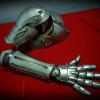Please stop bickering and undo your negatives, there are better answers/education/explanations etc. and it's not productive to do anything but use this as a teaching opportunity.
Growth hormone increases cellular turnover, but has it's own aging side effects as one or another effect that it has can impair kidney function. TMK, using IGF1 is better for what you're probably looking for and growth hormone isn't everything. The metabolism also slows, so the increase in HGH that we see in the 20s might also be that we aren't metabolizing it as fast as we did in our teens. Ageless biometrics will be a mix of parameters from a variety of ages, not any one in particular.
SENS has a list of the most important things (as we know them presently) to aging. Indigestible cellular garbage, such as, but not limited to lipofuscin, glucosepane, and other such things build up over time and can't be removed, they impair the function of healthy metabolism and affect our biometrics as we age. So the most important thing is to remove these things, you can't just take hormones, they can make you feel younger, but depending on your predispositions, can be harmful long term, and redundant once you can removing aging's lynch pins. HGH or IGF1 can do a little to reduce this, but won't do enough on their own and may quicken aging which is not so readily recognizable such as EGFR figures (they are estimates until kidney function is reduced to 40-60%). So more appropriately, we need to look at what can be done to slow and reverse the aging process.
- Lipofuscin can be removed with DMAE or Centrophenoxine, though it will cause headaches
- Some AGEs (Advanced Glycation End products) can be removed with Sage extracts
- We can remove garbage in the ECM (extra cellular matrix) through our natural processes faster with AHAs (Alpha Hydroxy Acids) with acetate, pyruvate, etc.
- We can turn over the ECM faster with IGF1
- We can prevent and repair genetic damage with Blueberry anthocyanins (25-35%)
- We can quicken the demise and removal of old and damaged cells with p53 activators and senolytics with Resveratrol and Quercetin (respectively)
- We can restore telomere lengths in healthy cells with Astragaloside IV (epitalon might be another option).
- We can restore telomere lengths in critically short telomere cells with cycloastragenol (epitalon might be another option).
- Vinpocetine is similar to acetic acid (an acetate) and does something beneficial (buy it while you can, the FDA wants it off the market) for cognitive aging, maybe it's an age breaker? I'm not all that familiar with it...
- Tocotrienols preserve Klotho, which reduces incidence of age related diseases and pathologies, Klotho can also be increased with D3 and IGF1. This will slow aging and preserve healthy metabolism where their are holes in our ability to fight aging.
- We can prevent the formation of some AGEs with Thiamine HCl (a specific form of B1) or use Benfotiamine, P5P, or other versions of B6, though these reduce dopamine levels and make you lazy... Blood sugar maintenance is a much better method. Avoid B complexes altogether for this reason.
- We can preserve telomere length with riboflavin B2
- We can reduce aging from inflammation with the white willow extracts standardized to contain salicin, or by using small, age appropriate doses of liquid NSAIDs (aspirin can cause ulcers for example which will reduce your ability to absorb nutrients and make you age faster... so be careful and don't ignore side effects). There are also things such as tart cherry extracts and boswellia serrata extracts for this.
Then there are also some very strong aging band-aids such as nicotinamide riboside (may be more, but I haven't seen data showing it yet). This stuff might also make you tired and lazy from my experience.
So these are the things you aught to be concerned with. Though I'm not sure how complete this list is. In any case, your money is best spent on the things that permanently/sustainably restore youthful function, and prevent aging, and then on what manages aging better than your body as a healthier organism. That's the best way IMO to understand this argument and make something productive out of it.
As you restore more and more youthful function more productively, you'll also accelerate your intellectual development as aging has already been slowing this down in you from the time you were a small child. So hopefully you'll decide to help us with research and development so we can all get smarter and younger faster together! 

























































